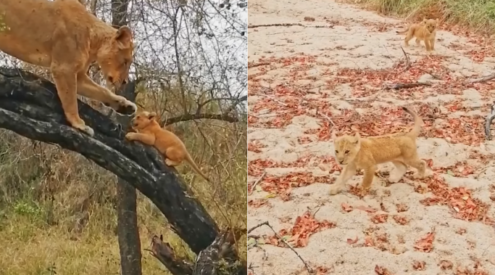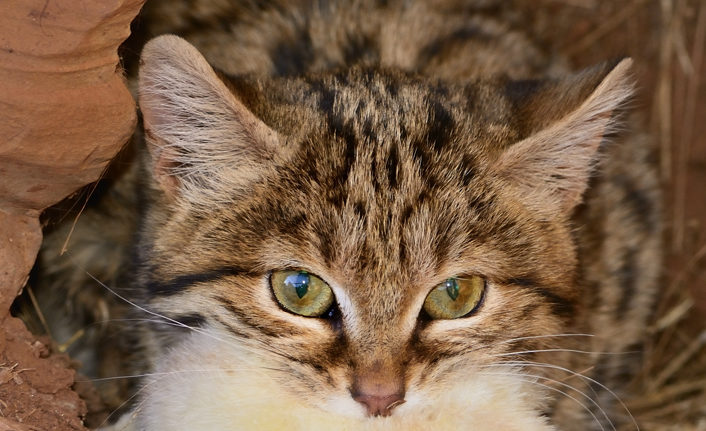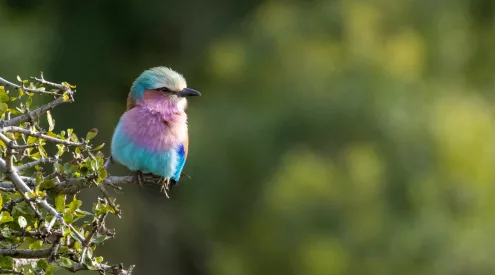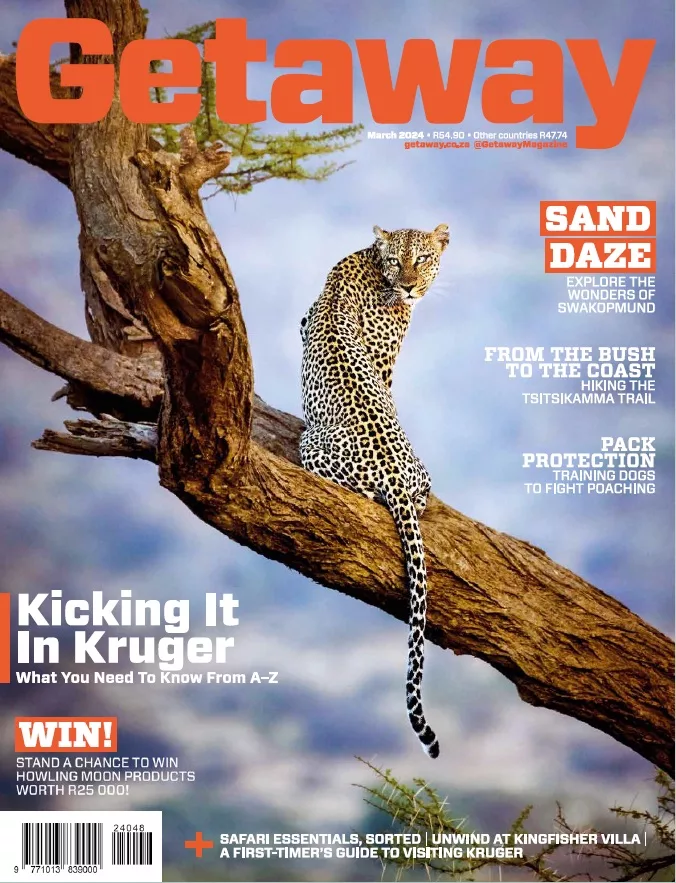Weighing in at a whopping 2 kg and a body length of 35-50 cm, the black-footed cat is Africa’s smallest, and deadliest of cats. With a hunt success rate of 60%, the highest of all cats, the black-footed cat is the ultimate feline predator.
But what makes them so deadly? Being the most successful of hunters in the felid species, successfully hunting most of their prey, whereas the lion only has a hunt success rate of 20%. They also come with a healthy appetite, having an accelerated metabolism that requires them to hunt almost non-stop.
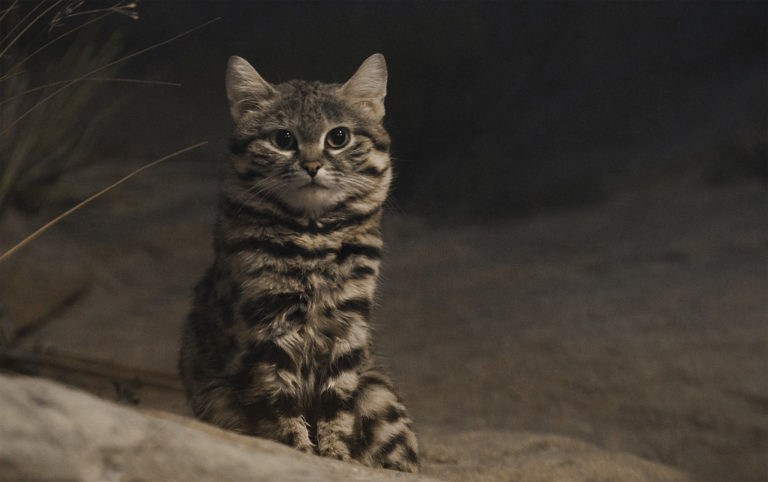
The black-footed cat has the highest hint success rate of all cats, making it the deadliest of all cat species. Credit: Jonathan Kriz/ Flickr Commons
The small cat is always on the go, easily traversing a territory of 20 square kilometres a night. A well-equipped hinter and can capture more prey in a single night than a leopard does in six months, One black-footed cat can consume 3 000 rodents a year and larger males are even known to take down a Cape hare, which is around the same size as the cat.
Where are they found?
Usually living in dens, the nocturnal species are distributed throughout South Africa and only found in three countries: South Africa, Namibia and Botswana. They are predominantly found in short-medium length grass plants, scrub deserts and sand plains such as the Kalahari and Karoo deserts.
Sheltered throughout the heat of the day, the cat’s dens tend to be abandoned termite mounds or burrows. Their habit of resting in termite mounds has earned them the local name of ‘anthill tiger’. These rare animals are incredibly difficult to study but fortunately, Gyra, a mother black-footed cat in the Northern Cape has been studied for some time now.
Dr Alexander Sliwa, leader of the Black-footed Cat Working Group has been observing black-footed cats for years now said that Gyra ‘must be one of the best and persistent hunters I have encountered in my thousands of hours of following and watching black-footed cats in the wild.’
These cats are incredibly difficult to study, tending to disappear into taller grasses, making it difficult to track. But what is known is that the species is listed as vulnerable on the IUCN red list of endangered species, meaning that it is at a high risk of endangerment in the wild.
Mostly solitary, except for a mother with dependent kittens, and during mating. Mothers will frequently change dens to avoid attracting predators.
Conservation
Like many wild cat species, the black-footed cat also falls victim to predator-control schemes. Indiscriminate poisoning of carcasses to kill Caracals and jackals also affects other cats who scavenge.
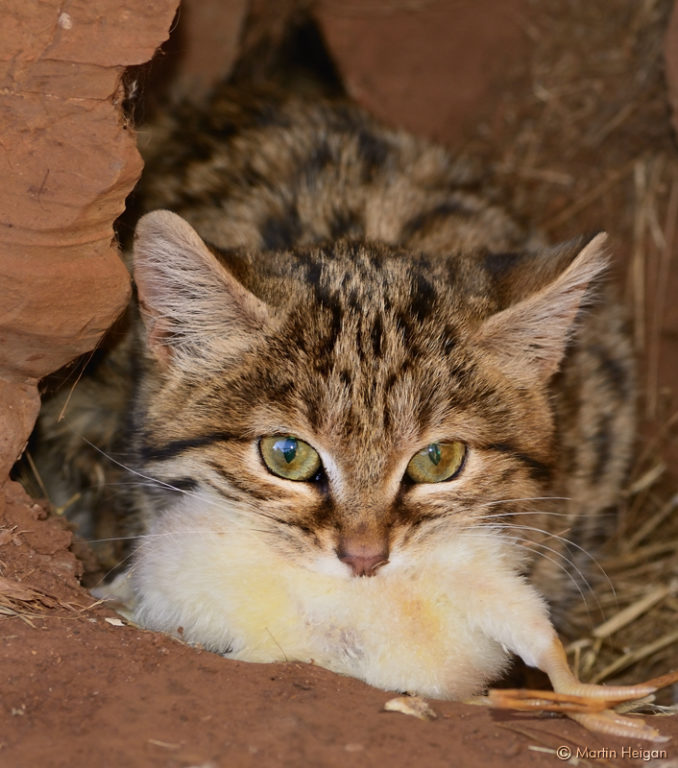
A black-footed cat about to enjoy dinner. Credit: Martin Heigan/ Flickr Commons
Overgrazing by livestock is also prevalent throughout their range, and sometimes fall victim to dogs which are used to chase and dig out jackals during ‘problem animal operations.’
Because black-footed cats are so solitary and elusive, little research has been done about them. The Black-footed Cat Project hopes to fill these gaps with current projects looking into species diversity.
Research is also investigating the coexistence between livestock grazing and carnivores, looking into ‘predator smart farming’.
Interesting facts
- These cats have a reputation as vampire cats based on their ability to live without water. The body fluids of their prey are sufficient for all their liquid requirements.
- In the wild, they live for up to 6 years but captive black-footed cats have lived for up to 16 years.
- Because of chromosomal differences, the black-footed cat cannot interbreed with other cats.
- It does not have many natural predators but is threatened by poison and traps set by farmers for other predators.
- These cats tend to have a hunting range of 20 square kilometres.
- Their characteristic black feet help them to walk on the deserts scorching hot sand.
Also read:




